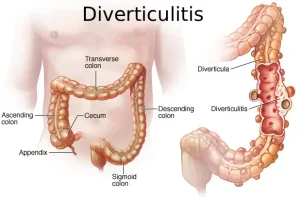Overview
Diagnosis
A number of conditions can cause pain and other symptoms related to diverticulitis. Your health care professional will perform an exam and order specific tests to determine the cause of your symptoms.
During the physical exam, your health care provider will gently press different areas of your abdomen to identify where pain or tenderness occurs. A pelvic exam may also be performed to rule out diseases of the female reproductive organs.
Laboratory tests may be used to rule out other conditions and confirm a diagnosis. These may include:
-
Blood tests to detect infection or immune activity
-
Urine test
-
Stool test
-
Pregnancy test
-
Liver enzyme test to rule out liver disease
A computerized tomography (CT) scan is often the most accurate diagnostic tool. It can reveal inflamed diverticula, abscesses, fistulas, or other complications.
More Information
-
Diverticulitis care at Mayo Clinic
-
CT scan
-
Ileostomy
Treatment
Treatment for diverticulitis depends on the severity of symptoms and whether complications are present.
Uncomplicated diverticulitis
When symptoms are mild and no complications exist, this condition is known as uncomplicated diverticulitis. In such cases, treatment can usually be managed at home.
-
A liquid diet is typically recommended until symptoms begin to improve, after which solid, low-fiber foods can be introduced gradually. Once fully recovered, a high-fiber diet may help prevent future flare-ups.
-
Fiber supplements may also be advised.
-
Antibiotics are often prescribed to treat infection. It’s important to complete the full course, even if symptoms improve.
Complicated diverticulitis
For severe cases or complications, hospitalization may be necessary.
-
Antibiotics are administered intravenously (IV).
-
Surgery may be required if complications develop, such as abscesses, fistulas, or perforations.
Surgery
Surgical treatment depends on the extent of the damage. Common procedures include:
-
Removal of the diseased section of the colon: The healthy portions of the colon are reconnected to restore normal bowel function.
-
Temporary colostomy: The healthy part of the colon is connected to an opening in the abdominal wall, allowing waste to pass into a colostomy bag. This gives the diseased section time to heal before reconnection.
Surgery is often performed using minimally invasive laparoscopic techniques, though open surgery may be required in some cases. Additional surgical procedures may be needed to manage complications such as peritonitis or fistulas.
Follow-up care
After recovery, your healthcare provider may recommend a colonoscopy about six weeks or longer after symptoms resolve. This test helps detect irregular growths, inflammation, or signs of colon cancer. The timing and need for a colonoscopy depend on how severe your diverticulitis was and when your last screening was performed.
Advertisement

